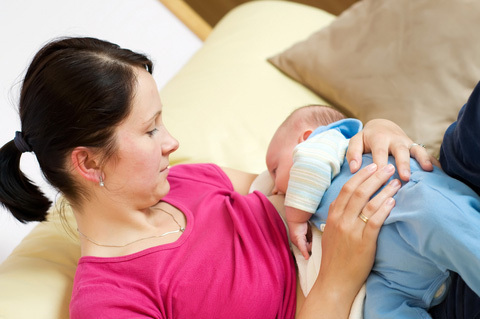Obese Women Less Likely to Breast-Feed

CHICAGO — New mothers are less likely to breast-feed if they are obese, a new study suggests.
In the study of more than 66,500 new mothers in the United States, obese women were 16 percent less likely to say that they had ever breast-fed their baby, compared to normal-weight women.
Overall, about 75 percent of obese women said they had ever breast-fed, compared with 81 percent of normal-weight women.
The findings held even after the researchers took into account factors that could affect the chances of breast-feeding, such as smoking, giving birth prematurely and feeling depressed. [11 Big Fat Pregnancy Myths]
The study could not determine the reason for the link between obesity and a lower likelihood of breast-feeding. But previous research suggests that it takes about one day longer before obese women's bodies reach their full milk supply (often called milk "coming in"), compared with normal-weight women. This may lead to problems with breast-feeding in the first few days, and could result in some obese women switching to formula, said study researcher Dr. Teresa Orth, a maternal fetal medicine fellow at the Truman Medical Center in Kansas City, Mo., who presented the findings here at the meeting of the American Congress of Obstetricians and Gynecologists.
In addition, some lactation consultants say obese women can have trouble positioning the baby to breast-feed, Orth said. Sometimes, extra breast tissue covers the baby's nose, and prevents the baby from breathing, so the baby detaches from the breast, Orth said. Pressing the extra breast tissue down to keep it from covering the baby's nose can prevent this problem, but some women may not know to do this, so they might think that breast-feeding is not working, Orth said.
The new finding suggests obese women should be targeted as a group that may need additional help with breast-feeding, Orth said.
Get the world’s most fascinating discoveries delivered straight to your inbox.
"Just like if a woman was at high risk for high blood pressure, we would check her blood pressure more often, well if she's at high risk for having breast-feeding issues or breast-feeding failure, we should check in with her more often so that she has the resources she needs," Orth said.
At Truman Medical Center, where Orth works, all women are given a number to call if they need assistance breast-feeding, she said.
The study results are based on a survey of U.S. mothers in 25 states that was done between 2009 and 2010.
Breast-feeding has been linked to a number of health benefits, as well as to a reduced risk of health problems such as childhood obesity, sudden infant death syndrome (SIDS) and certain childhood infections.
Follow Rachael Rettner @RachaelRettner. Follow Live Science @livescience, Facebook & Google+. Original article on Live Science.

Rachael is a Live Science contributor, and was a former channel editor and senior writer for Live Science between 2010 and 2022. She has a master's degree in journalism from New York University's Science, Health and Environmental Reporting Program. She also holds a B.S. in molecular biology and an M.S. in biology from the University of California, San Diego. Her work has appeared in Scienceline, The Washington Post and Scientific American.


